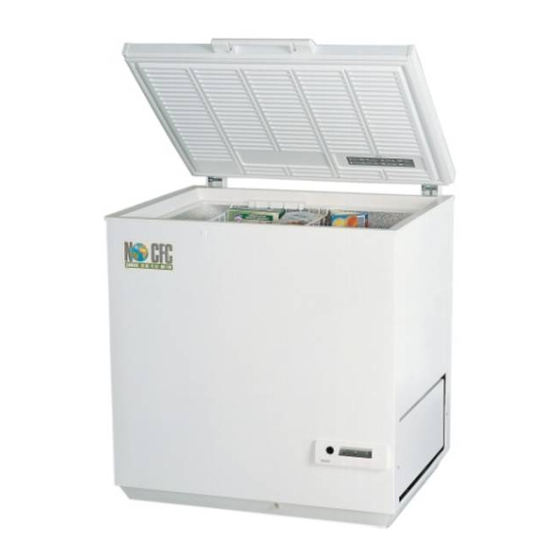Zanussi ZFC 310 Betriebs- und Installationshandbuch - Seite 7
Blättern Sie online oder laden Sie pdf Betriebs- und Installationshandbuch für Gefrierschrank Zanussi ZFC 310 herunter. Zanussi ZFC 310 9 Seiten. Chest freezer zfc 220; zfc 310
Auch für Zanussi ZFC 310: Betriebs- und Installationshandbuch (4 seiten)

PACKAGING AND POSITIONING
Food must be cold before freezing (no more than
room temperature).
Food must be packed in airtight and moisture-proof
packaging to prevent it from drying out.
Place fresh food for freezing close to the cold sides
of the freezer, making sure that it is not in contact with
the frozen food already in the freezer.
Never fill the freezer to more than 5 mm below the top
edge.
See under "Helpful hints".
CAPACITY (5)
The freezing capacity of the freezer is stated in the data
plate (kg/24 hours). Do not exceed the amount stated - if
you do, the freezing time will be extended. The data plate
is located inside the lid.
IMPORTANT
The freezing capacity stated can be utilised to the
full occasionally to freeze large amounts of fresh
food. However, if the freezer is filled with large
amounts of food for freezing every day, the capacity
stated is reduced by about one-third.
LOCK (6)
(Not a standard accessory for all models.) The lock works
as shown in the drawings. Remember to keep the key out
of the reach of children.
BASKET (7)
The baskets are designed for the storage of food which
has already been frozen. The handles can be placed in
two positions, as shown in the drawings.
The baskets can either be placed inside the freezer or
hung on the edge of the casing.
HELPFUL HINTS (9)
STORAGE
Frozen food can be stored anywhere inside the
freezer, but should be kept at least 5 mm below the
top edge. Never exceed the maximum storage time for
purchased frozen food. When you buy frozen food, make
sure that it has been stored at the correct temperature. Do
not buy products which have wet or damaged packaging.
Place purchased products in your freezer as quickly as
possible. We recommend using an insulated bag to bring
such products home with you. Never place bottles, warm
objects, or fizzy drinks in the freezer.
FREEZING
Only use fresh food of the best quality. Cool hot
dishes to room temperature as quickly as possible
before placing them in the freezer. Wrap food carefully in
freezer foil, or use the special freezer boxes or bags
which are on the market. Divide food into small portions
before freezing - this ensures that freezing is more rapid,
and means that you only need to defrost the amount
needed for immediate consumption. Remember that
defrosted food must not be re-frozen. However, dishes
which have been made using defrosted food may be
frozen. Mark the freezer packaging with the date of
freezing. We recommend keeping a record of the
contents of your freezer. If freezing is too slow, the quality
of the food being frozen deteriorates. Consequently, do
not freeze larger amounts than stated in the freezer's data
plate. If you wish to freeze food several days in a row, the
maximum freezing capacity stated per day is reduced by
about one-third. As far as possible, keep the lid closed
during freezing. If you know nothing about home
freezing, we recommend that you purchase a book
containing advice and guidelines.
DEFROSTING
In general food should not be defrosted at room
temperature, since this increases the risk of
bacteria growth. It is best to defrost large portions of
meat or poultry in the refrigerator, and this also applies to
food which is to be consumed as it is (e.g. fruit, butter
and sliced meat). Small portions of food can be cooked
straight from the freezer. A good number of ready-to-cook
dishes can also be cooked without defrosting. Always
observe the instructions on product packaging. Bread
tastes good when defrosted in a moderate oven.
Microwave ovens can be used for the rapid defrosting of
most frozen foods. Observe the instructions for use of
the microwave oven concerned.
ACCESSORIES
Spare baskets can be obtained from your local
Service Centre. The illustrations on this page
show how many baskets can be placed in the various
freezer models. Measure the length of your freezer and
find the appropriate illustration. The number above each
illustration indicates its length in millimetres.
MAINTENANCE
DEFROSTING (8)
The formation of frost on the inside of freezers cannot be
avoided. Frost is formed when moisture contained in the
air comes into contact with the cold surfaces of the
freezer.
Consequently, the lid should only be opened when
necessary, and it should never be left open.
A thin layer of ice or frost does not affect the function of
the freezer adversely, and can be removed carefully
using the scraper provided.
IMPORTANT
Never use a knife or any other sharp implement to
remove frost.
When the frost or ice layer is 10-15 mm thick, the freezer
should be defrosted. We suggest that you defrost your
freezer when there is little or no food inside.
Switch off the current. Remove the contents of the
freezer, wrap them in newspapers, and leave them in a
cold place.
The speed of defrosting can be increased by placing one
or more bowls of hot (not boiling) water inside the freezer
GB
7
